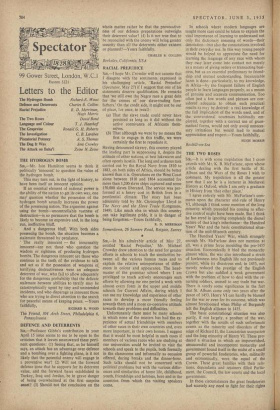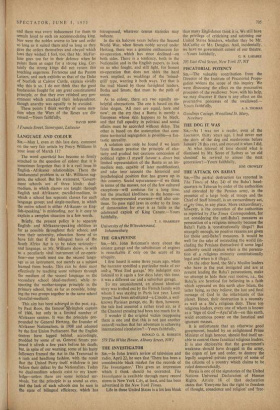THE TWO ROSES is with some trepidation that I cross
swords with Mr. K. B. McFarlane, upon whose article dealing with the first battle of St. Albans and the Wars of the Roses I wish to comment. My trepidation is all the greater now that I see he is a lecturer in Mediaeval History at Oxford, while I am only a graduate in History from 'that other place.'
I agree entirely with Mr. McFarlane's com- ments upon the character and• rule of Henry VI, although I think some mention of the long minority which preceded his coming to effec- tive control might have been made. But I think he has erred in ignoring completely the dismal nature of that king's inheritance: the Hundred Years' War and the basic constitutional situa- tion of the mid-fifteenth century.
The Hundred Years' War, which strangely enough Mr. McFarlane does not mention at all, was a prime force moulding the pre-1455 situation. Economically it bled the monarchy almost white, the war also introduced a strain of lawlessness into English life not previously present, while its disastrous end, in 1453, not merely reduced the prestige of the English Crown but also saddled a weak government with the problem of how to deal with the re- turning soldiers, unused to any trade but war. There is surely some significance in the fact that St. Albans came only two years after the peace of 1453. Henry VI can hardly be blamed for the war or even for its outcome, which was almost foredoomed when Philip of Burgundy left the English alliance in 1435.
The basic constitutional situation was also partly, if not largely, a product of the war, together with the results of such unfortunate events as the minority and disorders of the reign of Richard 11, the Lancastrian usurpation and the long minority of Henry VI. These pro- duced a situation in which an impoverished, unsuccessful and incompetent monarchy and government found itself in the midst of a small group of powerful feudatories, who, militarily and economically, were the equal of the Crown. These great families with their rela- tions, dependants and retainers filled Parlia- ment, the Council, the law courts and the local government.
In these circumstances the great feudatories had scarcely any need to fight for their rights and there was every inducement for them to remain loyal to such an accommodating king. Nor were the nobles averse to law and order so long as it suited them and so long as they gave the orders themselves and obeyed which laws they wished. I feel, too, that Mr. McFar- lane goes too far in their defence when he Paints them as eager for a strong king. Cer- tainly the strong kings did not return this touching eagerness. Fortescue and the Paston Letters, and such exploits as that of the Duke of Norfolk at Caistor Castle, explain vividly why this is so. I do not think that the great feudatories fought for any great constitutional principle, or that they ever relished any gov- ernment which attacked their independence. though anarchy was equally to be avoided.
These points I think worthy of some men- tion when the Wars of the Roses are dis- cussed.—Yours faithfully,
DAVID BOND
1 Francis Street, Stoneygate, Leicester



































 Previous page
Previous page